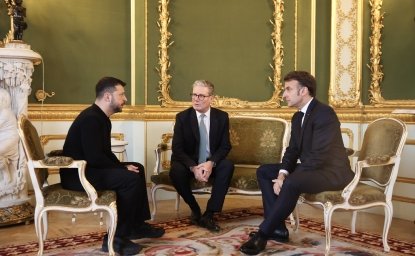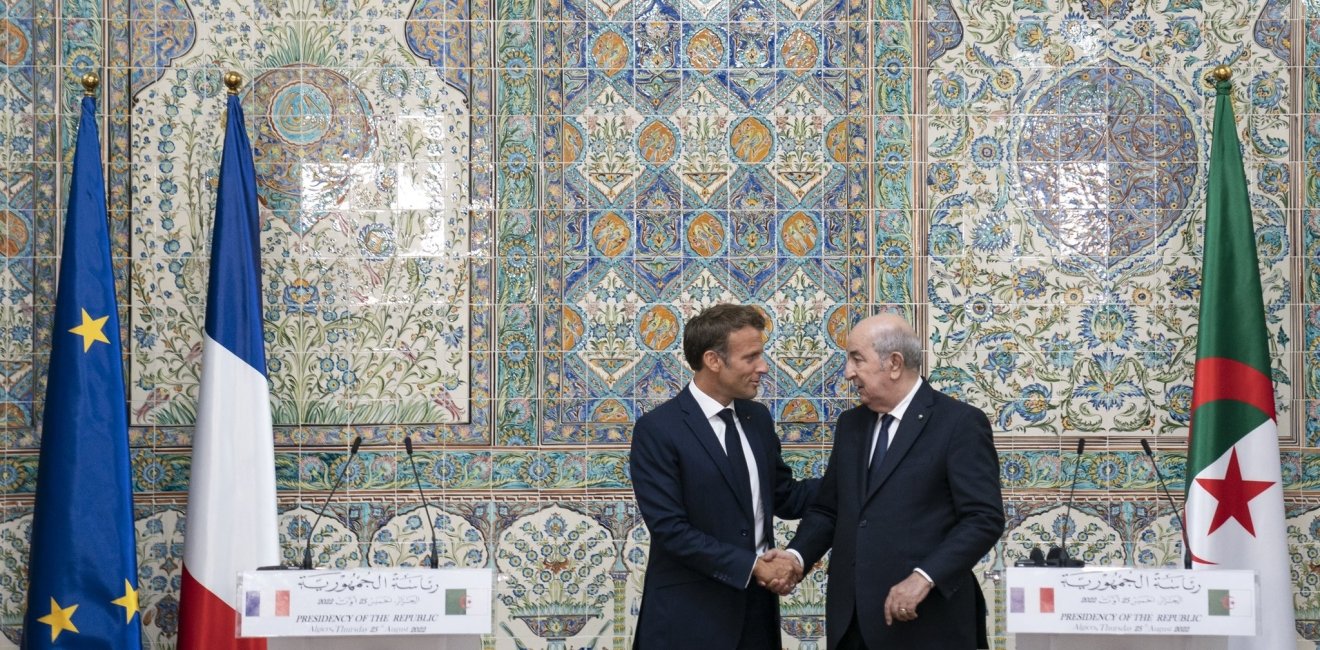French President Emmanuel Macron’s August 25-27 trip to Algeria was far more successful than might have been expected, given the poor relations between the two countries. It resulted in the proclamation of a “privileged partnership” the details of which were not specified, the creation of a High Council on Cooperation on the presidential level, and the promise of opening up the archives of both countries to a mixed commission of French and Algeria historians to study contentious issues of historical memory. The governments agreed on the general principle of encouraging movement between the two countries while cracking down on illegal immigration, but no specifics were announced.
In 2015, while a candidate for president, Macron made the highly controversial statement that colonialism was “true barbarism” and it was necessary to “present our excuses” to those who were harmed. But in September 2021 he declared that Algeria was a “political military system” constructed on a “rente memorielle” (endless exploitation of history) and a hatred towards France. He raised the question of whether an Algerian nation had even existed before French colonialism. These comments resulted in the bitter tensions that Macron’s visit was intended to resolve.
Better relations would serve both France and Algeria who have shared strategic interests. They face each other across the Mediterranean. They both want to prevent the spread of Islamic fundamentalism in the Sahel and clamp down on the threat of fundamentalists and terrorists within. There is a large population of Algerians in France and many French citizens of Algerian descent. France enjoys the presence of imams provided by Algeria who are considered reliable. Algeria would benefit from more French investment. At a time of energy shortages, France and Europe would like to assure access to more Algerian oil and gas. Although not emphasized, this was surely one of Macron’s goals.
This apparent concord is precarious, however. One reason is the half century old rivalry between Algeria and its neighbor Morocco which manifests itself particularly over the future of the former Spanish Sahara. Algeria actively supports the Polisario Front, an independence movement, whereas Morocco claims the territory as part of Morocco and has occupied it since the Green March of 1975, resulting in intermittent fighting. It is hard to maintain good relations with both Algeria and Morocco.
The second and more important reason is the legacy of colonialism and the bloody Algerian War for independence (1954-1962). Although independence took place 60 years ago the scars of this conflict continue to fester and catharsis has not been achieved. History and memory become battlefields. Ironically, opening up the archives may perpetuate rather than resolve tensions.
The military regime in Algeria bases its legitimacy on its leadership role in the Algerian revolution. This historic legitimacy is especially important given the regime’s lack of democratic bona fides. When an attempted opening through free elections in 1991 was leading to an Islamist victory at the polls, the army stopped the balloting and a brutal civil war ensued. In 2019 the peaceful Hirak movement protested the manipulated reelection to a fifth term of Abdel Bouteflika, widely considered senile and a mere figurehead for “le pouvoir” (the name given to the dominant military). The military ousted him but then successfully prevented real democratization. The FLN’s lack of democratic legitimacy dates back to its origins. It suppressed and liquidated rival nationalist movements during and after the war for independence. For that reason, it is doubtful that it will genuinely want to open its archives to independent scholars.
Confronting historical memory also risks focusing on the extreme violence of 130 years of French colonialism in Algeria in which the indigenous population lost its land and property and was deprived of civil and political rights. The process of decolonization was also horrific; the French army employed torture, and when it became clear that de Gaulle was considering independence, elements of the army revolted. Towards the end, radicalized settlers joined the terrorist Organisation Armée Secrète (OAS), fought against the French army and blew up much of Algeria’s infrastructure. There’s good reason why France has practiced a kind of “pact of forgetting” about this period; it’s not clear that focusing on the past will favor good comity between the two countries.
French domestic politics also constitutes a serious impediment to good relations with Algeria. A million French settlers were forced to leave Algeria at independence; many were never reconciled to their loss. The Front National (FN), founded in 1972 by Jean-Marie Le Pen, a parachutist in the French army during the Algerian War, constituted in many ways the revenge of the settlers. It propagated hatred of North Africans and opposition to North African immigration. Far from disappearing, the FN, renamed the Rassemblement National (RN) has flourished under the leadership of his daughter, Marine Le Pen, who received 41 percent of the votes on the second ballot of this year’s presidential elections; in the ensuing parliamentary elections the RN returned an unprecedented 89 members to the National Assembly. The existence of so powerful a movement on the far right may limit Macron’s ability to normalize relations with Algeria.
The Macron visit was a positive step. But the past still weighs heavily on Franco-Algerian relations.
Author

Author "Jews, Muslims, and the French Republic" (Cambria: 2023)

Global Europe Program
The Global Europe Program is focused on Europe’s capabilities, and how it engages on critical global issues. We investigate European approaches to critical global issues. We examine Europe’s relations with Russia and Eurasia, China and the Indo-Pacific, the Middle East and Africa. Our initiatives include “Ukraine in Europe”—an examination of what it will take to make Ukraine’s European future a reality. But we also examine the role of NATO, the European Union and the OSCE, Europe’s energy security, transatlantic trade disputes, and challenges to democracy. The Global Europe Program’s staff, scholars-in-residence, and Global Fellows participate in seminars, policy study groups, and international conferences to provide analytical recommendations to policy makers and the media. Read more

Explore More
Browse Insights & Analysis
360° View of How Southeast Asia Can Attract More FDI in Chips and AI

The Future of France's Far-Right Party


